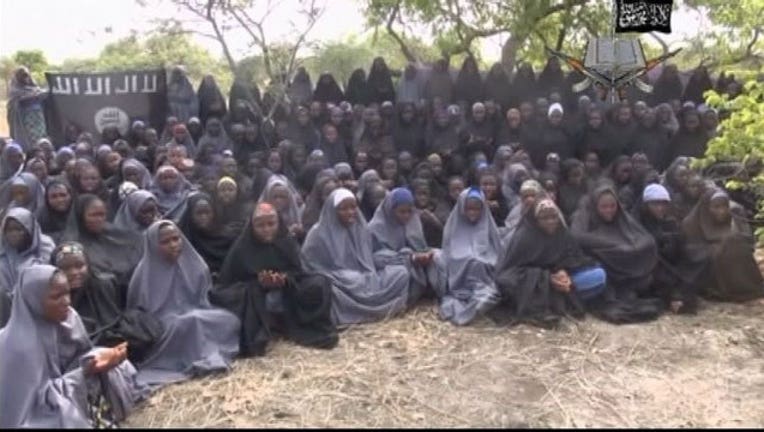Girl kidnapped by Boko Haram found traumatized, with baby

LAGOS, Nigeria (AP) - One of the teenagers kidnapped by Boko Haram extremists over two years ago from a school in northeastern Nigeria has been found with a baby and was reunited Wednesday with her mother -- the first of the Chibok girls to be freed since the mass abduction.
Nigerian hunters found the young woman and baby wandering near the Sambisa Forest and her uncle describes her as traumatized.
The young woman told her mother that some of the Chibok girls have died in captivity and the others still are held by Boko Haram, according to family's doctor, Idriss Danladi, who spoke to The Associated Press after a conversation with the mother.
She is the first of the 219 Chibok girls to be seen since the kidnapping grabbed worldwide attention and put a spotlight on the the violence of Nigeria's homegrown Islamic extremists.
Nigeria's military tried to claim her rescue. "This is to confirm that one of the abducted Chibok school girls ... was among the rescued persons by our troops," said a one-line statement from army spokesman Col. Sani Kukasheka Usman.
Hunters took the 19-year-old -- she was 17 when abducted -- to her home village of Mbalala, near Chibok, on Tuesday and she reunited with her mother, Danladi said. Her father died while she was held captive, said her uncle Yakubu Nkeki. Mother, daughter and baby have been taken to a military camp in the town of Damboa.
The girl's mother tried to commit suicide some months after her daughter was seized, said Danladi, who is from Chibok and has treated several of the parents. He said the mother "suffered a huge traumatic disorder ... I had to convince her that she just has to stay alive if she really wants her daughter returned home safe and sound."
At least 16 of the girls' parents have died since the kidnapping, he said. Others have ailments they blame on their ongoing trauma.
"I suffered a stroke on Friday, that's why you don't recognize my voice," said the Rev. Enoch Mark, whose two daughters are among the missing girls. He said the escape of the first Chibok girl brings renewed hope.
"I believe that, by the grace of God, our daughters, some of them, will be found if they are still alive."
Other Chibok girls may have been rescued by soldiers hunting down Boko Haram in the remote northeastern Sambisa Forest on Tuesday night, said Chibok community leader Pogu Bitrus. He said he is working with officials to establish their identities.
Boko Haram Islamic extremists stormed and firebombed the Government Girls Secondary School at Chibok on April 14, 2014, and seized 276 girls who were preparing to write science exams. Dozens escaped in the first hours, some hanging on to tree branches from the back of an open truck, but 219 remained missing.
The inability of Nigeria's government and military to rescue them led, in part, to last year's electoral defeat of President Goodluck Jonathan, who was seen as uncaring and not committed to freeing them.
The United States, France and Britain offered help to find the girls, sending drones that flew over the Sambisa Forest, hostage negotiators, intelligence officers and others.
A social media campaign using the hashtag (hash)BringBackOurGirls reached to the White House, where U.S. first lady Michelle Obama promised her husband would do all in his power to help. "Our prayers are with the missing Nigerian girls and their families. It's time to (hash)BringBackOurGirls," she tweeted in May 2014.
"God reigns!" one of the founders of the Bring Back Our Girls movement, Oby Ezekwesili, trumpeted on social media Wednesday. "OUR (hash)ChibokGirl ... IS BACK!!!!!!! (hash)218ShallBeBack because (hash)HopeEndures."
It's not known how many thousands of girls, boys and young women have been kidnapped by Boko Haram in a nearly 7-year-old insurgency that has killed some 20,000 people and spread across Nigeria's borders.
The freed young woman may well face a difficult time returning to ordinary life, according to experts.
"Children in this situation typically require medical assistance and psycho-social support to help them cope with what they have been through while they were in captivity," Helene Sandbu Reng, spokeswoman of the U.N. Children's Fund, said in a statement noting the agency could not verify that one of the Chibok girls is free.
"Our experience with children and women who were kidnapped by Boko Haram and freed by the military or escaped shows that they often face mistrust, stigma and rejection when they return to their communities," she said.
Boko Haram held a large swath of northeastern Nigeria where it declared an Islamic caliphate. A multinational force from Nigeria and its neighbors has reduced their territory, reportedly hemming them into the Sambisa Forest. The insurgents have taken to hitting soft targets like markets and mosques with suicide bombers, often girls and young women who are feared to be among their captives.
Now there are fears that Boko Haram is sending fighters to Libya to join the Islamic State group, U.S. Deputy Secretary of State Antony Blinken said at a summit about fighting Boko Haram on Saturday. Boko Haram declared itself the West Africa Province of IS last year, and Blinken's suggestion raises fears the two groups could start an extremist push into the vast and lawless lands of the Sahel region.

